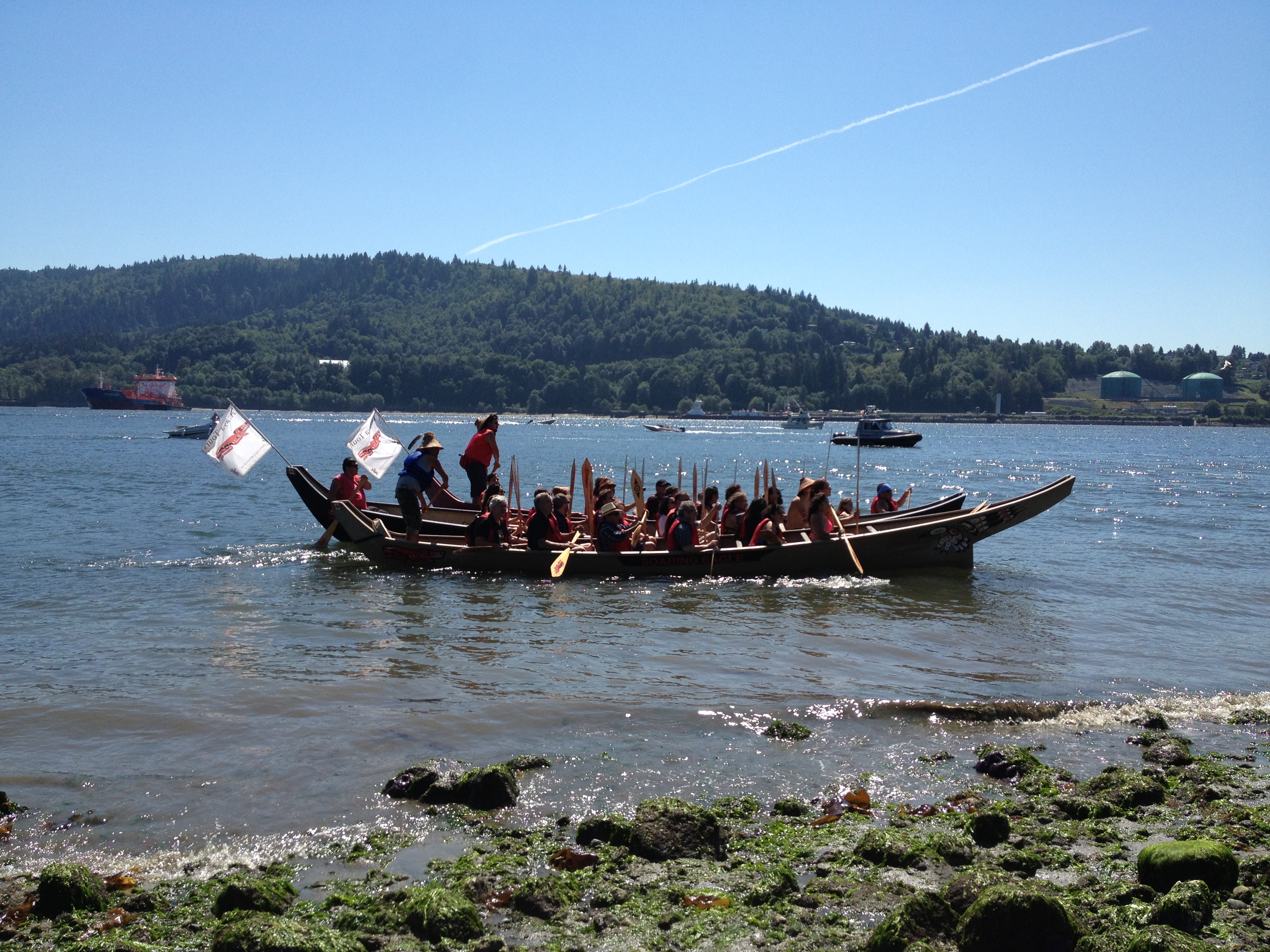Like a real-life game of Risk, the threat of pipelines stood manifest in the huge green petroleum holding tanks perched on the south side of Burrard Inlet, B.C., dwarfing three canoes carrying Tsleil-Waututh First Nations and other anti-pipeline allies Sunday afternoon.
Paddlers performed a ceremony at the third annual Salish Sea Summer Gathering to show that oil, in particular, the twinning of Kinder Morgan’s Trans Mountain Pipeline that would subject B.C. waters to an estimated 400 tankers per year, is not welcome in the Tsleil-Waututh Nation’s ancestral waters.
The event brought people together in Whey-ah-Wichen (Cates Park) in North Vancouver for a full day’s worth of community building and entertainment, featuring First Nations, activists, politicians, musicians and artists speaking out against the relationship between government and big business.
Speakers included Chief Maureen Thomas, Greenpeace International co-founder Rex Weyler and a speech and song (“Earth Revolution”) by Ta’kaiya Blaney, who may only be 13, but speaks with a wisdom well beyond her years. Other features were a BBQ with traditional foods such as smoked salmon and bannock, a poetry stage highlighting the poems of Chief Dan George and several solar and electric energy displays.
The location of the event across the water from the Kinder Morgan petroleum terminal — which handles crude petroleum and jet fuel — as well as the large tanker that stood stubbornly in the inlet was a prominent part of the day’s conversations, as evidence of industrial interests line the shore and mountainsides of both Burnaby and Vancouver, which the park faces from its vantage point above the inlet’s tides.
“Directly behind me is the Kinder Morgan terminal. I have pictures of my grandmother harvesting Salmon out of the water right here and cooking it. This is a very special place to me that’s very beautiful,” said Reuben George, community development director for the Tsleil-Waututh Nation Sacred Trust, the organizers of the event, who are suing the federal government over the proposed Trans Mountain expansion.
“I grew up on these waters, played on these waters, I’ve done ceremonies on these waters. And Kinder Morgan is just an example of the devastation that is happening that makes Canada one of the number one polluters in the world,” George added.
Many other speakers also shared stories and fond memories of growing up on the Salish Sea, but the most prevalent topic and call to awareness from speakers was to highlight the recent disaster caused by the Mount Polley Mine tailings pond breach in the Cariboo Regional District. Some 20-plus band members from the St’át’imc Nation travelled to the gathering to give a first-hand account of the difficulties Aboriginal peoples are facing in the aftermath of the incident.
Anecdotes were told of fish caught since the disaster whose skins fell right off of their bodies when cooked or hung. Chiefs have asked their people to refrain from fishing — a way of life and survival for many both in the affected area and downstream from it — because of the debris and toxicity of the water and the lack of information being offered by the government right now.
While many gave emotional testimony to both the sacredness and importance of the land, water and air and the grave dangers that an oil spill of any size poses to the ecosystem, the overall aim of the event was to face government and industry-led efforts to twin Kinder Morgan’s Trans Mountain Pipeline with messages of hope and foster interconnection and solidarity between First Nations, environmental groups, as well as others in the battle to control the futures of the land and therefore its inhabitants.
“I think any way to deliver a message is important. Like, maybe a scientist will touch people that I can’t. Maybe a lawyer will touch people who I can’t, maybe a youth will touch people I can’t, and for sure — I know this — a musician, because I can’t sing, will touch people like I can’t,” George said of the importance of the summer gathering, encouraging people from all walks of life to get involved.
“The guiding principles behind what we do come from our culture and our spirituality and those are the teachings of humanity of love, respect, honor, dignity, pride, compassion, understanding. Those are important things and those guide us in all aspects of the work that we do at from economic development, to community development, to everything and it’s sort of similar here,” George said.
“But trust me though, when push comes to shove, if they don’t listen to what we’re trying to do and reason with them and try to help them, not only ourselves — because if we win, everybody wins. If they win, everybody loses, including them and me and everybody. So, if push comes to shove, we will do what it takes to make sure that we stop it, but right now it’s pretty positive that were sending out a really good positive message.”
Carissa Thorpe is a Langara-trained freelance journalist in Vancouver who focuses on music, the environment and social justice issues.



